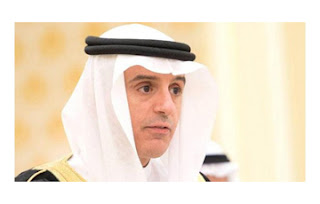Saudi Arabia has confirmed that maintaining international peace and security can only be reached through achieving justice and equality of peoples and nations as well as respect for the principles and provisions of international law, Saudi Press Agency (SPA) reported.
It stressed its keenness to achieve the purposes of the Charter of the United Nations in maintaining the security and safety of the peoples of the world, and that it has been and still remains at the forefront of supporting countries to make the Middle East a zone free of nuclear weapons and all weapons of mass destruction.
It also renewed its determination to eradicate the phenomenon of terrorism from its roots and fight it with its security and intellectual aspects as well as to dry its financial resources, denouncing strongly the terrorists' attempts to associate their crimes with Islam, which calls for love, peace, tolerance and moderation.
This came in the Kingdom of Saudi Arabia's speech which was delivered last night by Saudi Minister of Foreign Affairs Adel bin Ahmed Al-Jubeir in front of the 70th session of the General Assembly of the United Nations in New York.
He explained that the Palestinian issue is a permanent topic on the agenda of the General Assembly of the United Nations, despite all the ideas and initiatives that have been put forward so far, resulting in the continued suffering of the Palestinian people, who are still deprived of their right to live in dignity, in defiance of the principles of international law and the resolutions of international legitimacy.
He stressed the need to reach a solution to the Arab-Israeli conflict based on the Security Council's resolutions and the Arab Peace Initiative, put forward by Saudi Arabia 13 years ago, and leading to the establishment of an independent Palestinian state with Al-Quds as its capital.
Al-Jubair condemned the continuous Israeli violations of Al-Aqsa Mosque's sanctity via policies aimed at dividing it according to time and space levels, warning that the Israeli conduct poses a serious escalation in the conflict, and feeds the violence and extremism in the world.
ON Syria, Al-Jubeir pointed out that the Syrian crisis is entering its fifth year, and the international community is still unable to take crucial decisions to save the Syrian people from killing, destruction and displacement machine used by Bashar al-Assad, which led to the killing of more than 300,000 of Syrians, and the displacement of more than twelve million Syrians as well as the destruction of Syria in one of the biggest humanitarian catastrophe of the contemporary history.
"We see there is no way to end Syrian crisis but only through a political solution, based on the Declaration of (Geneva 1) aimed at the maintenance of the national, regional and unity of Syria, the preservation of the Syrian state's civil and military institutions and the formation of a transitional council to rule, with no room for Bashar al-Assad or whoever their hands are stained with the blood of the Syrian people," he said, adding that his country will continue to push for this solution, as it will remain at the forefront of countries supporting the Syrian people to meet the humanitarian needs and alleviate their suffering.
On Yemen, the Saudi Minister of Foreign Affairs explained that coalition forces to support the legitimacy in Yemen had made great achievements in the liberation of many areas from the rebels' grip, including the port city of Aden, which allowed for a legitimate government to return to Yemen, and the latest of these achievements was achieved just the day before yesterday by controlling Bab Al-Mandab (Mandeb Strait), which guarantees freedom of international navigation.
He stressed that the military option was the last option for the Kingdom of Saudi Arabia and the Coalition's countries, and came after the coup carried out by the forces of (Houthi - Saleh), and their takeover of the country and their blockade of the presidential palace in Aden as well as their threat of the legitimate president, where military intervention came at the request of the legitimate government in Yemen under Article (51) of the Charter of the United Nations.
Al-Jubeir further said that the goal of military operations in Yemen is to reduce the risk of militias and the protection of Sauid borders, and to find a political solution based on the initiative of GCC's Arab states, the outcomes of the national dialogue and UN Security Council Resolution 2216.
Al-Jubeir also confirmed that some parties are trying to escalate the crisis in Yemen through incitement and attempt to smuggle arms to the rebels, noting that on Saturday, September 26, 2015, an Iranian steamer had been stopped under the inspection mechanism set out in Security Council resolution (2216) loaded with weapons destined for the rebels, pointing out that this was not the only case of the smuggling of arms to the rebels by Iran.
"At the moment, the Kingdom of Saudi Arabia and the Coalition's countries are working to intensify coordination with international organisations to provide and deliver humanitarian aid to Yemen, and King Salman Centre for Relief and Humanitarian Aid plays a major role in providing the Yemeni people with assistance directly or through international relief organisations," he said, adding that the Custodian of the Two Holy Mosques King Salman bin Abdulaziz Al Saud ordered to rectify the conditions of Yemenis living illegally across the Kingdom's regions to enable them to work, and take advantage of Saudi educational and medical care.'
The Saudi minister highlighted his country's support to initiatives to make the Middle East a zone free of nuclear weapons and all weapons of mass destruction, and this, he said, prompted it to welcome any effort to achieve this goal, including the agreement reached by the group (5 +1) with the Islamic Republic of Iran, which prohibits Iran from obtaining a nuclear weapon.
Al-Jubair also said: "After the deal was reached, we hope that Iran abandons its negative interference in the affairs of Arab countries, which would be countered firmly by us, and at the same time, the Kingdom confirms its commitment to building the best relations with Iran, based on good-neighborliness, mutual respect and non-interference in the affairs of the region's countries. In this regard, the Kingdom renewed its demand for Iran to end its occupation of the three islands of the sisterly United Arab Emirates."
On terrorism, Al-Jubeir emphasised the fact that no one is immune from the results of this dangerous phenomenon that should not be linked to any religion, culture or race, "since we are, as a whole, a target for it and its risks", reiterating his country's determination to root out this phenomenon.
The Kingdom of Saudi Arabia is at the forefront of countries fighting terrorism and all its security and intellectual aspects while working to dry its financial resources, he stressed, adding that in this regard, we strongly condemn the terrorists' attempt to associate their crimes to Islam, while Islam calls for love and peace, tolerance and moderation.


No comments:
Post a Comment